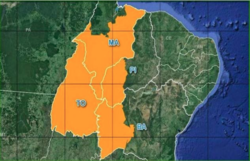
The social and environmental impacts linked to farmland investments could in themselves be enough for investors with ESG criteria to refrain from further investments in farmland in Matopiba (see map above). The financial risks that come with these impacts might also be considered by mainstream investors.
Farmland investments in Brazilian Cerrado: Financial, environmental and social risks
Following the financial crisis of 2007-2008, there has been a growing investor interest in farmland around the world. In Brazil, this interest has been most pronounced in the Cerrado, a large tropical savanna biome that covers more than 20 percent of the country. Here, institutional investors such as pension funds and private equity, real estate firms and agribusinesses have adopted business models that aim to produce value from land appreciation by acquiring land, clearing it from its native vegetation and transforming it into farmland. While land prices in the Cerrado have increased nearly fivefold between 2003 and 2016, there are signs that the farmland real estate market is currently overheated.
These large-scale farmland acquisitions have resulted in significant environmental and social impacts. Between 2013 and 2015, 1.9 million hectares (ha) of the Cerrado was cleared of its native vegetation. Cerrado deforestation contributed to 29 percent of Brazil’s carbon emissions. Moreover, land acquisition in Brazil is linked to a process of grilagem, whereby land deeds are falsified and later sold. Traditional communities have been impacted through forced removals, loss of hunting grounds and other livelihood impacts.
Key Findings
Financial risks: Brazil’s Cerrado region may be subject to a potentially overvalued farmland real estate market. Indications include 1) a disconnect between farmland and global commodity prices; 2) the financialization of farmland and inflationary effect of the entry of institutional investors; 3) investments moving into areas less suitable for agriculture; and 4) reduced market appetite for deforestation-related soy and other commodities.
Environmental risks: The Cerrado is one of the most environmentally sensitive areas in the world. Farmland investment models inherently drive the transformation of native Cerrado vegetation into agricultural land. This conversion contributes to increased carbon emissions, threats to biodiversity, reduced drinking water supply for Brazil’s large cities and erratic rainfall.
Social risks: Illegal land grabs can precede the acquisition of farmland by investors. Through a process known as grilagem, land is made inaccessible to traditional communities, after which property titles are forged. In several cases, such land is subsequently sold to farmland investors. Traditional communities consequently face negative livelihood impacts. This heightens the risks for violence, social unrest and litigation.
Risk might remain hidden to investors: Investors in farmland companies may be directly exposed to the risk of stranded land. Given the increased stakeholder attention to deforestation, it may become financially less attractive to transform forested land to farmland. Farmland investment firms generally do not specify whether their portfolio contains forested land.











